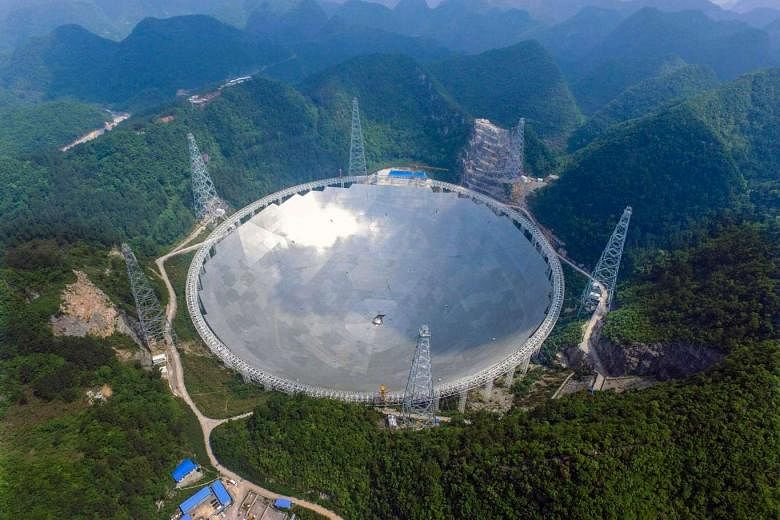PINGTANG COUNTY (China) • The hilly terrain in a remote corner of China's landlocked Guizhou province offers the ideal conditions for a radio telescope, especially one that is designed to listen for faint radio waves from outer space.
But plans by local officials to make the Aperture Spherical Telescope, or Fast, a tourist attraction could turn the 1.2 billion yuan (S$245 million) project into a waste of money, scientists said.
Recent tests showed that the world's largest single-dish radio telescope could pick up signals more than 1,000 light-years away, according to state broadcaster CCTV.
In order to do that, the telescope - which measures 500m in diameter - requires radio silence inside a 5km radius.
More than 9,000 villagers were relocated for this reason, and yet officials are now rolling out the red carpet for smartphone-wielding visitors, reported Chinese media.
A day after Fast began operations on Sunday, the Pingtang county government decided to open the site to the public.
The authorities have banned all radio-wave emitters, including cellphones, TV sets, microwave ovens and cars, within 5km of the telescope, but these measures are hard to enforce.
"Tourists may feel an impulse to take photos to share on social media," said Mr Zhang Shuxin, deputy manager of the Fast project, according to Caixin news website.
"Since Fast is highly sensitive to the weakest signals from the depths of space, a mobile phone being turned on near the site is like shining a flashlight into the eye of someone who has been staring at the stars in the dead of night. You'll be instantly blinded," he added.
An unnamed engineer, speaking to Chinese website Sixth Tone, said: "It is estimated that the daily operation of Fast costs 400,000 yuan. If one day is wasted, 400,000 yuan just disappears."
Mr Wu Xiangping, a research fellow at the National Astronomical Observatories in Beijing, in an interview with Caixin in August, said: "Scientists don't really want too many tourists to visit the site."
Local officials, however, have other ideas. Banners bearing slogans such as "take advantage of the big radio telescope, ignite big tourism!" line the main road leading to the mountain site where the telescope is located.
A 300ha theme park has been built just outside the 5km-radius area reserved for the Fast project, reported Caixin. The astronomy theme park includes a space-themed hotel, a tourist information centre and a space museum.
A local newspaper, the Guiyang Evening News, reported on Sunday that the theme park charges each visitor 368 yuan during the initial testing period, and nearly double the price - to 668 yuan - when the telescope is fully operational in three years' time.
Hotel employee Chen Keying, who is from the nearest town of Kedu, told Sixth Tone website: "More and more tourists come here because of the radio telescope. More than 10 rooms have been reserved for the coming national holidays."

